 Petzlover
Petzlover Antebellum Bulldog is originated from United States but Styrian Coarse Haired Hound is originated from Austria. Antebellum Bulldog may grow 13 cm / 6 inches higher than Styrian Coarse Haired Hound. Antebellum Bulldog may weigh 50 kg / 111 pounds more than Styrian Coarse Haired Hound. Both Antebellum Bulldog and Styrian Coarse Haired Hound has almost same life span. Both Antebellum Bulldog and Styrian Coarse Haired Hound has almost same litter size. Antebellum Bulldog requires Low Maintenance. But Styrian Coarse Haired Hound requires High Maintenance
Antebellum Bulldog is originated from United States but Styrian Coarse Haired Hound is originated from Austria. Antebellum Bulldog may grow 13 cm / 6 inches higher than Styrian Coarse Haired Hound. Antebellum Bulldog may weigh 50 kg / 111 pounds more than Styrian Coarse Haired Hound. Both Antebellum Bulldog and Styrian Coarse Haired Hound has almost same life span. Both Antebellum Bulldog and Styrian Coarse Haired Hound has almost same litter size. Antebellum Bulldog requires Low Maintenance. But Styrian Coarse Haired Hound requires High Maintenance
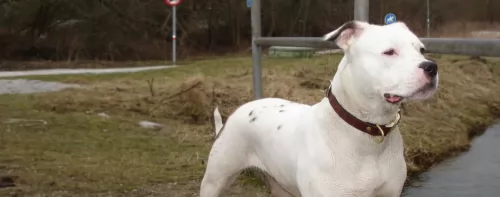 The history of the Antebellum Bulldog dates back the 1600s where it was used as a lasting solution to drive away hogs in rice plantation farms in Altamaha River in Georgia. After the plantation system became dominant in most parts of the United States, a majority of the farmers had to think of a more creative way of driving away wild feral pigs and cattle. Having caused multiple deaths to humans due to their massive bodies and extremely sharp horns, farm owners had no option but to employ bulldogs as the only means of security.
The history of the Antebellum Bulldog dates back the 1600s where it was used as a lasting solution to drive away hogs in rice plantation farms in Altamaha River in Georgia. After the plantation system became dominant in most parts of the United States, a majority of the farmers had to think of a more creative way of driving away wild feral pigs and cattle. Having caused multiple deaths to humans due to their massive bodies and extremely sharp horns, farm owners had no option but to employ bulldogs as the only means of security.
Although these dogs served their purpose of protecting their masters while still being family companions, their age of extinction came during the Civil War where the economy at the Altamaha region was permanently altered. After the fall of plantation farming and abolition of slavery, the Antebellum Bulldog became a forgotten breed something which led to its extinction. However, as years passed by, this rare breed was eventually reintroduced by the Maxwell family under strict guidelines by the Animal Research Foundation.
 The Styrian Coarse Haired Hound is a German hound, a medium sized breed that was found to originate in Styria in Austria. It was bred to be a boar hunting scent hound in the mountains. The breed is an Austrian Bracke and one of the largest. In the 1870’s the breed was developed by Karl Peintinger to get a hardy, rough coated hunting dog. Peintinger took the Istrian Hound and an old type scent hound of Hanoverian and continued selective breeding until he got the dog he wanted.
The Styrian Coarse Haired Hound is a German hound, a medium sized breed that was found to originate in Styria in Austria. It was bred to be a boar hunting scent hound in the mountains. The breed is an Austrian Bracke and one of the largest. In the 1870’s the breed was developed by Karl Peintinger to get a hardy, rough coated hunting dog. Peintinger took the Istrian Hound and an old type scent hound of Hanoverian and continued selective breeding until he got the dog he wanted.
The breed is still used to hunt boar and track wounded animals. They work in high altitudes and rough terrains. They were not created to be companion animals and most of them are still working dogs. They do not make great house or family pets. Because of these circumstances, the breed is rare today.
Sometimes you will see the breed called the Peintinger Bracke after its developer. The Austrian Kennel Club recognized the breed in 1889 and the Federation Cynologique Internationale as a scent hound. The Styrian Coarse Haired Hounds were next recognized in 2006 by the United Kennel Club in North America, but not the AKC – American Kennel Club. There are many smaller kennel clubs and organizations for the breed as well many hunting clubs.
As mentioned, the breed is the largest of the Austrian Brackes. They are one of the three breeds included in the Grand Brackes. The name comes from the fact that all these dogs were developed for hunting in the Austrian mountains. They are pretty much unknown in the rest of the world. They thrive in the harsh climates of the Austrian mountains.
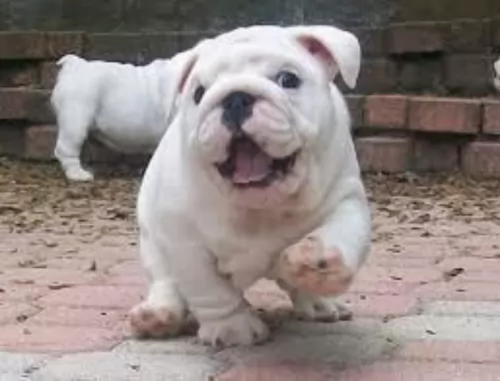 The Antebellum Bulldog is a recently introduced breed that was developed with an aim of recreating the historic working bulldog or Southern breed. First introduced in the United States, this bulldog was initially bred to be used as a working dog in rice plantations in Altamaha River Valley, a region in South East Georgia.
The Antebellum Bulldog is a recently introduced breed that was developed with an aim of recreating the historic working bulldog or Southern breed. First introduced in the United States, this bulldog was initially bred to be used as a working dog in rice plantations in Altamaha River Valley, a region in South East Georgia.
By nature, the Antebellum Bulldog is an extremely loving, loyal, affectionate, and very intelligent pet. Due to that reason, this breed is a perfect choice for a family dog. If we can get back to history, it’s evident that this dog breed was used in plantation farms to secure the rice from damages caused by cattle and wild hogs. Relating these tasks to the dog’s overall personality, you will find that indeed the Antebellum Bulldog is one such breed that can be trusted as a watchdog in today’s homes.
The Antebellum Bulldog is very similar to the American Bulldog only that it’s a little bit larger and bulkier with a proportionally bigger head. These breeds usually range from bigger to biggest with males weighing around 36 to 68 Kg (80—150 pounds) and females 32 to 50 Kg (70—110 pounds). Similar to the American Bulldog, the Antebellum Bulldog has a rough coat, long legs, an athletic body and short tail/ears that don’t require any cropping.
Despite of their intimidating appearance, the Antebellum Bulldog is an extremely loving, passionate, and loyal pet that will suit perfectly as a family dog. These dogs will lie down to their masters and will need nothing more than constant company. According to professional breeders, the Antebellum Bulldog is most likely to form a close attachment to one member of the family although they still do enjoy hanging out with the rest of the family members.
As it is the case with most American Bulldogs, the Antebellum Bulldog has a very strong protective instinct that makes it react violently when strangers step into its territories. Something else you need to know about this Bulldog breed is that it does get along well with kids to a point of being overprotective. Since puppies are usually over playful, adults are highly advised to watch out as they can accidentally bowl or knock over your toddler.
The Antebellum Bulldog doesn’t have to be professionally groomed as is the case with most dog breeds. Apart from a weekly brushing of the coat, the other grooming needs you’re supposed to observe include; regular brushing of the teeth and trimming of nails from an early stage.
 The Styrian Coarse haired Hound is well muscled, medium sized and lithe. They run easily on all types and levels of terrain. Their coat is rough and harsh, giving the breed part of its name. They can tolerate both extremes of the climate temperatures. They are strong and confident dogs wearing a very serious facial expression. These guys are all about the job – the hunt. Their prey drive is extremely high.
The Styrian Coarse haired Hound is well muscled, medium sized and lithe. They run easily on all types and levels of terrain. Their coat is rough and harsh, giving the breed part of its name. They can tolerate both extremes of the climate temperatures. They are strong and confident dogs wearing a very serious facial expression. These guys are all about the job – the hunt. Their prey drive is extremely high.
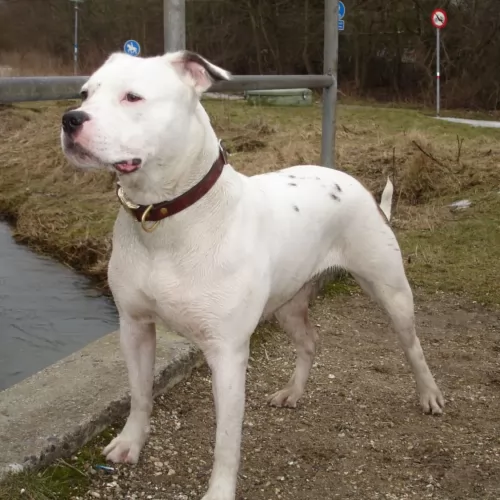 Although the Antebellum Bulldog is quite intimidating, this dog can make a great pet thanks to its loving, patient, and extremely tolerant characteristics. This dog enjoys playing with young children as well as other members of the family although proper care should be observed to avoid injuring young toddlers due to their muscular bodies.
Although the Antebellum Bulldog is quite intimidating, this dog can make a great pet thanks to its loving, patient, and extremely tolerant characteristics. This dog enjoys playing with young children as well as other members of the family although proper care should be observed to avoid injuring young toddlers due to their muscular bodies.
The Antebellum Bulldog is a protective dog breed with very strong guarding instincts. New visitors will have to be very careful as these dog breeds are quite wary of strangers and will not treat them politely. However, if you become familiar with them, they are likely to know you and later accept you as part of a large family.
Speaking of adaptability, the Antebellum Bulldog is more of a working dog than a household pet. Although some people will prefer to keep them indoors, always ensure that your homestead has a backyard where they can exercise. Otherwise, these dog breed will prefer to be kept in rural areas where there are vast tracks of land for them to play on.
Finally, the Antebellum Bulldog is an intelligent dog with a very sharp memory. However, due to their extremely playful nature, they can become very stubborn and messy. Therefore, owners are advised to train them early enough before they are fully grown.
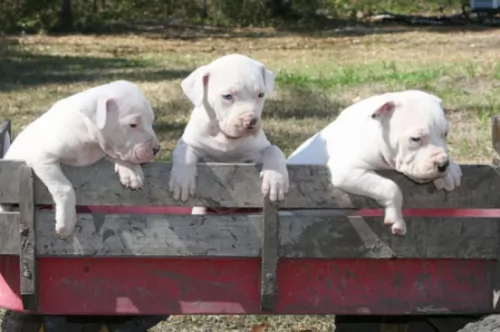 The Antebellum Bulldog has a life expectancy of 12—15 years. Recognized as an emerging breed, this dog doesn’t have many health problems as compared to most other dog breeds. Although these dogs are muscular and very athletic, these breeds suffer from various health conditions which are caused by the nature of their coat. Among the common health problems of the Antebellum Bulldog include
The Antebellum Bulldog has a life expectancy of 12—15 years. Recognized as an emerging breed, this dog doesn’t have many health problems as compared to most other dog breeds. Although these dogs are muscular and very athletic, these breeds suffer from various health conditions which are caused by the nature of their coat. Among the common health problems of the Antebellum Bulldog include
One major health problem that affects blue-eyed dog breeds (such as this one) is possible blindness. This condition is usually caused by diabetes, hypertension or Cushing’s syndrome. To treat this condition, you need to take your dog for regular veterinary checkups to know the root cause of the problem.
Another health problem that is very familiar with most Antebellum Bulldogs is hip dysplasia. Since these dog breeds are usually muscular and very huge, this condition is most likely to affect them, especially at an early stage. Dog owners should, therefore, be very familiar with this condition and should take their pets for regular veterinary tests to avoid it.
 The breed is fairly healthy and isolated from crossbreeding. They are susceptible to several major conditions.
The breed is fairly healthy and isolated from crossbreeding. They are susceptible to several major conditions.
• PRA or Progressive Retinal Atrophy = a group of degenerative, genetic eye diseases the cause blindness over time.
• Bloat – most large dogs suffer from this and not so much a medium breed like this one, but it is a condition that their energy levels and work ethics could lead to. Fatal if not treated immediately.
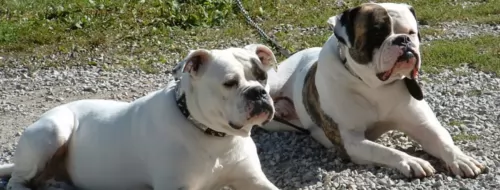 Feeding an Antebellum Bulldog is much similar to feeding other dogs. Owners are highly advised to stick to high-quality hypoallergenic diets that are rich in vitamins and nutrients. Now, since Antebellum Bulldog puppies are usually playful, feeding them with high nutrient food thrice a day will really help. Always avoid feeding your puppies with processed foods or foods with artificial sugars as they can expose the puppies to severe health problems.
Feeding an Antebellum Bulldog is much similar to feeding other dogs. Owners are highly advised to stick to high-quality hypoallergenic diets that are rich in vitamins and nutrients. Now, since Antebellum Bulldog puppies are usually playful, feeding them with high nutrient food thrice a day will really help. Always avoid feeding your puppies with processed foods or foods with artificial sugars as they can expose the puppies to severe health problems.
When feeding senior Antebellum Bulldog, there are some small changes you’ll need to make. First, these dogs will require high-quality foods that are easy to digest. Wet foods are perfect for Antebellum Bulldogs as they will help to keep them hydrated. Buy dog foods low in calories and rich in essential vitamins and nutrients to match your dog’s energy.
Antebellum Bulldog can add extra weight if proper care is not observed when feeding them. Due to this reason, these dogs should be fed depending on their level of activity to avoid cases of obesity.
Since their ancestors were used to guard rice plantations in Altamaha, Antebellum Bulldogs are very energetic and highly suited in rural settings over indoor lifestyle. However, if you decide to keep these dogs as pets in your households, it’s advisable that you provide them with some playing space in the backyard.
When it comes to training the Antebellum Bulldog, owners are advised to train them to be obedient at an early stage as they can get really stubborn in the future. These dogs are very intelligent and they never forget what they learn once they’ve mastered it.
 1Feeding the puppy – Feed this very active breed a high quality dog food for medium sized dogs. Feed puppies 3-4 times a day a total of ¾ to 1 cup.
1Feeding the puppy – Feed this very active breed a high quality dog food for medium sized dogs. Feed puppies 3-4 times a day a total of ¾ to 1 cup.
2.Feeding the adult - feed this very active breed a high quality, high protein diet. Feed the adult 1-2 times a day a total of 1.6 cups of dry food.
4. Games and Exercises They are energetic, athletic and extremely agile. They are muscular and lithe and need a lot of exercise. The is a dog that can travel across rough terrain for hours at a time. They are tenacious hunters and need an outlet for that prey drive.
They need space and time to run. A large yard is great because you don’t want to take them to a dog park. Give them a lot of toys and puzzles. They excel at lure coursing, field trials and hunting trials. Their sense of smell makes them great at nose work and they like agility, tracking and rally obedience.